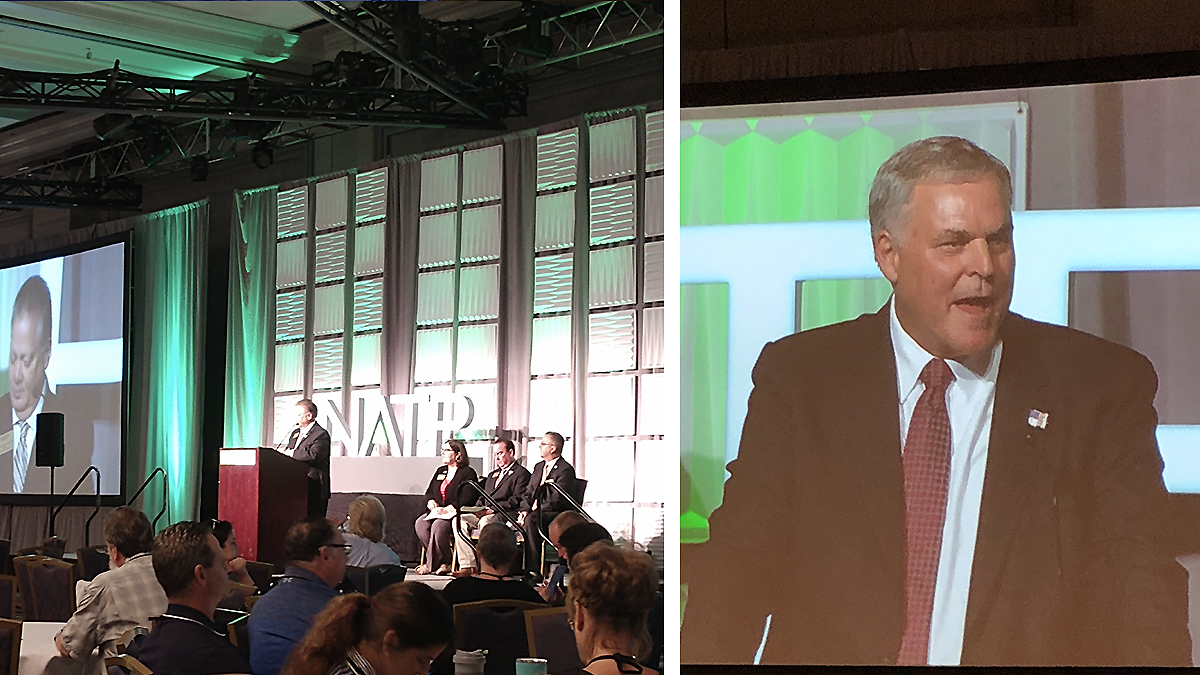Blog by Tim McGuffin, EA – Staff Accountant
Members of the Storen Financial team recently attended the National NATP Conference in Chicago, IL in order to further our tax knowledge and gain insights into the most recent changes in the tax law.
The National Association of Tax Professionals’ goal is to help tax professionals serve their clients with the highest level of excellence. Members benefit from unmatched tax education, timely information, and are equipped to serve the taxpaying public honestly, expertly and professionally.
Here are the top 5 takeaways we brought with us from this conference…
1) Collections – Have you ever seen those commercials that say “If you owe the IRS more than $10,000 and you want your debt resolved for pennies on the dollar, call us today!”?
Did you wonder why they only want people with debts over $10,000? These are usually companies that specialize in filing Form 433-A and 433-B with the IRS to settle debts for less than what is owed. This is called and Offer in Compromise (“OIC”) and has been around since 1954 (it’s not a new program like the ads claim). The reason companies target people who owe a lot is because the IRS is unlikely to reduce the debt of people who don’t owe very much. Also, these forms are long and take a long time to fill out, so they charge anywhere from $500 – $5,000 to provide this service, which doesn’t make sense for the taxpayer unless they are going to save a lot off the tax debt. Storen Financial Group does not do OIC work because it is a specialty area we have never taken on, so if you have significant tax debt, one of these companies may be able to help you. But beware, not everyone qualifies or will save much, so don’t pay for these services until you know it makes financial sense! The OIC process also takes a long time, so be patient and get ready for a fight that can last a year or more!
2) Partnerships – Do you have a partnership agreement for your business?
The Bipartisan Budget Agreement in 2015 created a new system for the IRS to audit partnerships that applies to all partnerships now (unless the partnership opts out each year). This new system is called the Centralized Partnership Audit Regime and it allows audits of partnerships to be done entirely at the partnership level and the IRS will work exclusively with the “partnership representative” (identified on each year’s tax return and doesn’t have to be a partner). If the audit results in taxes owed, the partnership representative decides how it will be paid (by the partnership, pushed out to the partners, etc.) and the partners have to abide by that decision. Remember that audits usually happen several years after the fact, so you may be liable for taxes from a partnership that you are no longer a part of or have to pay taxes for a partnership that you are in now but weren’t in for the year that was audited! This stresses the importance of the partnership agreement because the partnership representative and the policy for how to deal with any taxes and with new partners or partners who left should be spelled out in that document. If your partnership doesn’t have a partnership agreement or hasn’t been updated in decades, you should contact an attorney soon.
3) Retirement Plans & Loans – Did you take out a loan on your 401(k) then leave your job?
If you have a 401(k) through your employer, you may be able to take a loan out at a pretty low rate and go on a dream vacation, buy an RV, remodel your house, etc. This usually works just fine, but if you lose your job (quit, retire, get laid off, etc.) the outstanding balance on that loan will be treated as a distribution from the 401(k) and you will be taxed on it. This could be a major tax problem since no taxes were withheld; if you are under the age of 59 that could be 32% or more for federal taxes and about 5% for Indiana taxes. You typically have 60 days to repay the loan to avoid this, but many people won’t be able to come up with the money that quickly.
4) The Affordable Care Act – Don’t have health insurance in 2019?
In prior years that meant you paid an additional tax called the Individual Shared Responsibility Payment (unless you qualified for an exemption). The Tax Cuts and Jobs Act of 2017 changed the amount of that penalty to $0 starting January 1, 2019 (it was not repealed, it is still on the books, but the amount was simply changed…for now).
5) Due Diligence – Why does Storen ask to see birth certificates and other documents from schools, doctors, etc.?
Why do we ask you where the kids spend the night, who pays for the costs of living, etc.? The IRS is so understaffed that they decided to “deputize” all paid tax preparers. In order for us to sign and file tax returns, we have to agree to a “code of ethics” that among other things, requires us to verify that taxpayers are eligible to claim the Earned Income Credit. Then they added the Child Tax Credit/Additional Child Tax Credit and American Opportunity Tax Credit in 2017. Then they added the Head of Household filing status in 2018. We can only imagine what the IRS will add next. The penalty for us not asking these questions and requesting the documents starts at $520 per credit! We appreciate your understanding and patience as this is our reality and we will continue to ask the questions indefinitely.

